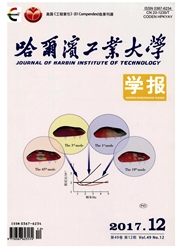

 中文摘要:
中文摘要:
以非合作航天器的相对状态确定为研究背景,针对无法在目标航天器上安装测量光标的问题,提出利用目标航天器自然特征的单目视觉测量方案.并针对仅利用非合作航天器自然特征而导致的粗大误差增大等问题,提出了基于RandomizedRANdomSAmpleConsensus(R.RANSAC)的相对位姿单目视觉确定鲁棒算法,该算法首先采用R—RANSAC剔除粗大误差,然后利用基于特征点的相对位姿确定迭代算法消除其他类型的误差影响,以进一步提高算法确定精度.与航天器交会对接视觉系统不同,该系统无需在目标航天器上安装测量光标,而是充分利用目标航天器的自身结构特征,因此更适用于非合作航天器问的相对状态测量.最后对本文算法进行了数学仿真,结果表明该算法的有效性和可靠性.
 英文摘要:
英文摘要:
Taking relative pose determination of non-cooperative spacecraft as research background, a monocular vision measurement scheme by using natural features of the target spacecraft was proposed to solve the problem that the measuring markers can not be installed on target spacecraft. A robust algorithm of monocular vision relative pose determination was presented based on Randomized RANdom SAmple Consensus (R- RANSAC) against the issue of gross error increase caused by the only use of natural features of non-cooperation spacecraft. The R-RANSAC was used to eliminate the gross error in the algorithm firstly, and then other types of errors were reduced taking advantage of iterative algorithm of relative pose determination based on feature points to further improve the determination accuracy. Different from computer vision techniques for RVD (Rendezvous and Docking) spacecraft, the proposed method does not require specialized markers to be presented on the target, therefore it is applicable to the non-cooperation relative pose determination. The mathematical simulation results show the availability and reliability of the presented algorithm.
 同期刊论文项目
同期刊论文项目
 同项目期刊论文
同项目期刊论文
 期刊信息
期刊信息
